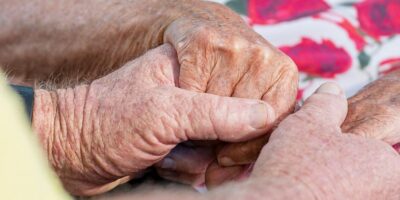Guest Blog by Pippa Kelly. Pippa Kelly is an award-winning blogger and writer on elderly care and dementia. Her debut novel ‘Invisible Ink’, which has a dementia thread, was published last year, and her articles have appeared in virtually every UK national newspaper.
I often say that I merely record things, while those working in health and social care whether as managers, care workers or activity coordinators actually do them. They act, I write. I do so in the hope that my words may inform, offer comfort through shared experiences and spread best practice. And one of the most important lessons I’ve learnt since setting up my blog three years ago, is that it isn’t the projects or therapies per se (whether gardening, singing or reminiscing) that enhance the lives of care home residents and those with dementia. It’s the people, and the connections they make.
Take, for example, Simona Florio, an Italian pocket-rocket of a woman who refused to give up when Lambeth’s Healthy Living Cafe in London (where she was coordinator) closed in February 2012. Realising that what made the cafe special wasn’t its formal structure but the people involved, two months after the cafe shut its doors she opened its successor, to the delight of the scores of folk who use it every week, many of whom have dementia.
“The club is the perfect model of social care and shows the good that can happen when labels disappear and human warmth, kindness and connection take over.”
The Healthy Living Club, as its now known, is a magical place, a community of individuals who help each other when we meet, as Simona describes it. There are no ‘service users’ or ‘service providers’, merely people enjoying themselves – singing, dancing, and eating a homemade cooked lunch together. The club is the perfect model of social care and shows the good that can happen when labels disappear and human warmth, kindness and connection take over.
Simona’s words, and the attitude of everyone involved in the Healthy Living Club, remind me of the Japanese models of dementia care, in which, in place of carers and cared for, they have ‘treasured partners’.
Japan has undergone three eras of dementia care. The first, during the 1980s, was the era of the cure – when people with the condition were placed in care homes, given medication and virtually written off. The second, the era of care, came in the 1990s, when sub-standard person-centred care was introduced. Although laudable in its aims, the pioneering treatments (such as music and art therapies) were foisted on care homes without any consideration of what their residents might actually want.
The third and current phase of care in Japan is known as the era of reciprocity. Emphasis is placed on everyone sharing their lives, on those with and without dementia influencing and being influenced, inspiring and being inspired. The approach is not unilateral, but equal.
This reciprocal purpose lies at the heart of the best dementia care (and care in general), where individuals are seen for who they are, not the condition they have. Often, the mere fact of looking past the dementia and seeing the person, sparks connections and makes positive things happen.
One of my early blogs focused on a young artist called Rachel Mortimer who did just that. Invited to teach painting in a care home, Rachel realised the moment she walked in that it was a home for people with dementia, but nobody had told her.
Others might have walked away. Rachel sat down and attempted to talk to some of the residents, using the art and paintings on her ipad. Little by little, with eye contact and touch as much as words, she engaged with the elderly people, and slowly but surely even some of those who hadn’t spoken for weeks started to talk.
The key, Rachel realised, lay in having something concrete to focus on and talk about, and thus the idea for Engage and Create, the social enterprise which 37-year-old Rachel set up in 2012, was born. Designed to improve the quality of life for people with dementia and those who care for them, the enterprise began with Ignite sessions and now offers training packages and works with partners on a consultancy basis.
Whether we use the words ‘ignite’, ‘spark’, ‘create’ or ‘provoke’, the message is the same. We all need to make connections: it’s a basic human need. Once orthodox verbal communication is no longer possible, as for those with dementia, other ways must be found. Some people, such as Rachel and Simona (and countless others I’ve met through my writing), seem instinctively to know how to do this, others can be trained.
“However it’s done and whoever does it, the crucial point is that we all want to experience the humanity of another’s touch.”
However it’s done and whoever does it, the crucial point is that we all want to experience the humanity of another’s touch – whether this comes through eye contact, body language or calming sounds and words. I think this is what it means to be human. Just because someone is in a care home, needs the support of carers or has dementia doesn’t change this. It makes it even more important.
Pippa Kelly also blogs for the Huffington Post and you can follow her on Twitter and Facebook.




